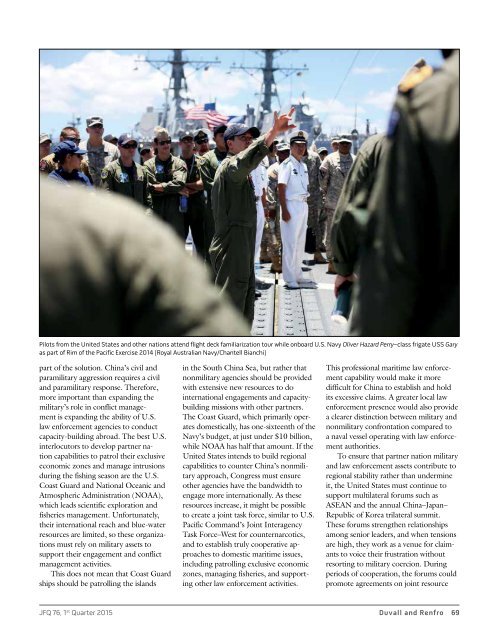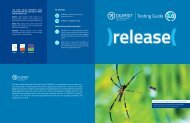jfq-76
jfq-76
jfq-76
Create successful ePaper yourself
Turn your PDF publications into a flip-book with our unique Google optimized e-Paper software.
Pilots from the United States and other nations attend flight deck familiarization tour while onboard U.S. Navy Oliver Hazard Perry–class frigate USS Gary<br />
as part of Rim of the Pacific Exercise 2014 (Royal Australian Navy/Chantell Bianchi)<br />
part of the solution. China’s civil and<br />
paramilitary aggression requires a civil<br />
and paramilitary response. Therefore,<br />
more important than expanding the<br />
military’s role in conflict management<br />
is expanding the ability of U.S.<br />
law enforcement agencies to conduct<br />
capacity-building abroad. The best U.S.<br />
interlocutors to develop partner nation<br />
capabilities to patrol their exclusive<br />
economic zones and manage intrusions<br />
during the fishing season are the U.S.<br />
Coast Guard and National Oceanic and<br />
Atmospheric Administration (NOAA),<br />
which leads scientific exploration and<br />
fisheries management. Unfortunately,<br />
their international reach and blue-water<br />
resources are limited, so these organizations<br />
must rely on military assets to<br />
support their engagement and conflict<br />
management activities.<br />
This does not mean that Coast Guard<br />
ships should be patrolling the islands<br />
in the South China Sea, but rather that<br />
nonmilitary agencies should be provided<br />
with extensive new resources to do<br />
international engagements and capacitybuilding<br />
missions with other partners.<br />
The Coast Guard, which primarily operates<br />
domestically, has one-sixteenth of the<br />
Navy’s budget, at just under $10 billion,<br />
while NOAA has half that amount. If the<br />
United States intends to build regional<br />
capabilities to counter China’s nonmilitary<br />
approach, Congress must ensure<br />
other agencies have the bandwidth to<br />
engage more internationally. As these<br />
resources increase, it might be possible<br />
to create a joint task force, similar to U.S.<br />
Pacific Command’s Joint Interagency<br />
Task Force–West for counternarcotics,<br />
and to establish truly cooperative approaches<br />
to domestic maritime issues,<br />
including patrolling exclusive economic<br />
zones, managing fisheries, and supporting<br />
other law enforcement activities.<br />
This professional maritime law enforcement<br />
capability would make it more<br />
difficult for China to establish and hold<br />
its excessive claims. A greater local law<br />
enforcement presence would also provide<br />
a clearer distinction between military and<br />
nonmilitary confrontation compared to<br />
a naval vessel operating with law enforcement<br />
authorities.<br />
To ensure that partner nation military<br />
and law enforcement assets contribute to<br />
regional stability rather than undermine<br />
it, the United States must continue to<br />
support multilateral forums such as<br />
ASEAN and the annual China–Japan–<br />
Republic of Korea trilateral summit.<br />
These forums strengthen relationships<br />
among senior leaders, and when tensions<br />
are high, they work as a venue for claimants<br />
to voice their frustration without<br />
resorting to military coercion. During<br />
periods of cooperation, the forums could<br />
promote agreements on joint resource<br />
JFQ <strong>76</strong>, 1 st Quarter 2015 Duvall and Renfro 69




